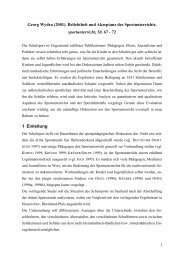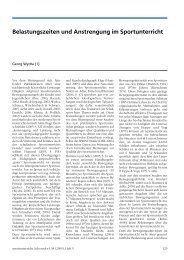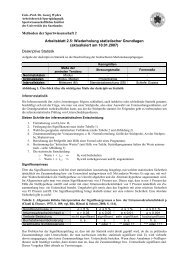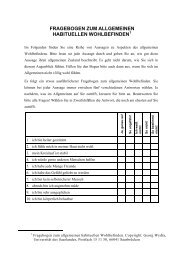Der Fragebogen zum allgemeinen habituellen Wohlbefinden (FAHW)
Der Fragebogen zum allgemeinen habituellen Wohlbefinden (FAHW)
Der Fragebogen zum allgemeinen habituellen Wohlbefinden (FAHW)
Sie wollen auch ein ePaper? Erhöhen Sie die Reichweite Ihrer Titel.
YUMPU macht aus Druck-PDFs automatisch weboptimierte ePaper, die Google liebt.
Wydra: <strong>Fragebogen</strong> <strong>zum</strong> <strong>allgemeinen</strong> <strong>habituellen</strong> <strong>Wohlbefinden</strong> 28<br />
Literatur<br />
Abele, A. & Becker, P. (1991). Vorwort. In A. Abele & P. Becker (Hrsg.), <strong>Wohlbefinden</strong>.<br />
Theorie, Empirie, Diagnostik. Weinheim: Juventa.<br />
Abele-Brehm, A. & Brehm, W. (1986). Zur Konzeptualisierung und Messung<br />
von Befindlichkeit. Die Entwicklung der Befindlichkeitsskalen (BFS). Diagnostica,<br />
32, 209 - 228.<br />
Andrews, F. M. & Withey, S. B. (1976). Social indicators of well-being. Americans<br />
perceptions of life quality. New York: Plenum.<br />
Antonovsky, A. (1979). Health, Stress and Coping. New Perspectives on Mental<br />
and Physical Well-Being. San Francisco: Jossey-Bass.<br />
Becker, P. & Minsel, B. (1986). Psychologie der seelischen Gesundheit. Bd. 2.<br />
Göttingen: Hogrefe-Verlag.<br />
Becker, P. (1989) <strong>Der</strong> Trierer Persönlichkeitsfragebogen. Handanweisung.<br />
Göttingen: Hogrefe-Verlag.<br />
Becker, P. (1991). Theoretische Grundlagen. In A. Abele & P. Becker (Hrsg.),<br />
<strong>Wohlbefinden</strong>. Theorie, Empirie, Diagnostik (S. 13 - 49). Weinheim: Juventa.<br />
Bradburn, N. M. (1969). The structure of psychological well-being. Chicago:<br />
Aldine.<br />
Breslow, L. (1972). Quantitative approach to the World Health Organization<br />
definition of health: Physical, mental and social well-being. International<br />
Journal for Epidemiology, 1, 347 - 355.<br />
Brickman, P. & Campbell, D. T. (1971). Hedonic relativism and planing the<br />
good society. In M. H. Appley (Ed.), Adaptation level theory: A symposium.<br />
New York: Academic Press.<br />
Costa, P. T. & McCrae, R. R. (1980). Influence of extraversion and neuroticism<br />
on subjective well-being: Happy and unhappy people. Journal of Personality<br />
and Social Psychology, 38 (4), 668 - 678.<br />
Dann, H.-D. (1991). Subjektive Theorien <strong>zum</strong> <strong>Wohlbefinden</strong>. In: A. Abele, & P.<br />
Becker (Hrsg.), <strong>Wohlbefinden</strong>. Theorie, Empirie, Diagnostik (S. 97 -<br />
117).Weinheim: Juventa.<br />
Diener, E. (1984). Subjective well-being. Psychological Bulletin, 95, 542 - 575.<br />
Diener, E. et al. (1985). Intensity and frequency: Dimensions underlying positive<br />
and negative affect. Journal of Personality and Social Psychology 48<br />
(5), 1253 - 1265.<br />
Diener, E. & Emmons, R. A. (1985). The independence of positive and negative<br />
affect. Journal of Personality and Social Psychology 47 (5), 1105 -<br />
1117.<br />
Fairbank, J. C. T., Couper, J., Davies, J. B. & O´Brien, J. P. (1980). The Oswestry<br />
Low Back Pain Disability Questionnaire. Physiotherapy, 66, 271 -<br />
273.<br />
Faltermaier, T. (1994). Gesundheitsbewußtsein und Gesundheitshandeln. Über<br />
den Umgang mit Gesundheit im Alltag. Weinheim: Beltz.<br />
Frank, R. (1991). Körperliches <strong>Wohlbefinden</strong>. In A. Abele & P. Becker (Hrsg.),<br />
<strong>Wohlbefinden</strong>. Theorie, Empirie, Diagnostik (S. 71 - 95). Weinheim: Juventa.<br />
Glatzer, W. & Zapf, W. (Hrsg.). (1984). Lebensqualität in der Bundesrepublik.<br />
Frankfurt: Campus.<br />
Goebel, G. (Hrsg.). (2001). Ohrgeräusche: psychosomatische Aspekte des<br />
komplexen chronischen Tinnitus. München: Urban und Vogel.<br />
Gotlib, I. H. & Meyer, J. P. (1986). Factor analysis of the multiple affect adjective<br />
checklist: A separation of positive and negative affect. Journal of<br />
Personality and Social Psychology, 50 (6), 1161 - 1165.

















